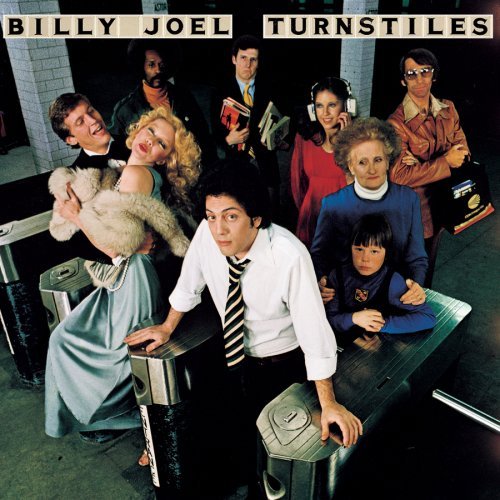
Turnstiles (1976)

1. Say Goodbye to Hollywood
2. Summer, Highland Falls
3. All You Wanna Do is Dance
4. New York State of Mind
5. James
6. Prelude/The Angry Young Man
7. I've Loved These Days
8. Miami 2017 (Seen the Lights Go Out on
Broadway)
Turnstiles is an album that marks both a return and a reset for Billy Joel. Having relocated back to New York after a disillusioning stint in California, Joel approaches this record with greater confidence, stronger material, and a clearer artistic identity. Though still imperfect—particularly in its production—it represents a turning point. For the first time, he records with his touring band rather than studio session players, and dismisses his previous producer, Michael Stewart. Joel himself assumes production duties, and while the resulting sound is an improvement over earlier efforts, his lack of experience behind the console shows in moments of sonic imbalance and missed potential.
Nevertheless, Turnstiles is a thematically cohesive and musically diverse album, one that solidifies Joel’s bond with New York and signals his growing command of lyrical voice. Say Goodbye to Hollywood and New York State of Mind serve as a kind of autobiographical frame, chronicling the departure from and subsequent return to the city that most fully defined his artistic temperament. The latter, in particular, became a local anthem—though its resonance seems tied specifically to its urban geography, rarely performed by Joel outside the city itself.
Among the most striking moments is Angry Young Man, which opens with a flurry of percussive piano and charges forward with conviction. Its lyrical bite and autobiographical edge render it one of Joel’s most enduring live staples, revealing a deeper emotional connection than his more famous—but arguably more impersonal—Piano Man.
Musically, the album moves fluidly between genres without descending into disunity. The reflective Summer, Highland Falls is tempered and lyrical, while Miami 2017 (Seen the Lights Go Out on Broadway) projects a dystopian narrative into a muscular, forward-driving rock arrangement. Even the lighter moments show ambition: All You Wanna Do Is Dance, a reggae-inflected departure, is playful and underappreciated. James is perhaps the album’s weakest entry—a wistful, if slight, meditation on diverging paths between friends. The set closes with I’ve Loved These Days, a nostalgic ballad whose lyrics evoke a lifestyle seemingly distant from Joel’s own origins. Whether biographical or imagined, the song brings a sentimental and graceful conclusion.
At just eight tracks, Turnstiles is brief by contemporary standards, yet it is unusually consistent. That Joel later revisited several of these songs in re-recorded form on Songs in the Attic suggests a lingering dissatisfaction with the studio results. Even so, the album stands as one of the most focused and personal of Joel’s early catalog. It is a transitional work, poised between ambition and polish, but more importantly, it marks the moment when Joel’s voice—both literal and artistic—begins to truly sound like his own.
Back To Main Page
Go To Next Review